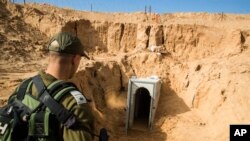Massive earthworks and mounds of sandy soil line the Israel-Gaza border as the Israeli military forges ahead with an ambitious subterranean barrier to detect and prevent attack tunnels from reaching southern Israel from the Palestinian enclave.
Israeli military officials on Thursday touted the secretive project as a major deterrent against what Israel has seen as a strategic threat since the last war against Hamas exposed the extent of the tunnels. Israel has made uncovering the tunnels from Gaza a priority and in recent months has demolished at least three through a combination of intelligence, infantry operations and hi-tech sensors.
Israel began construction of a 40-mile long underground wall last summer, aiming to prevent Palestinian militants from burrowing toward Israeli communities along the border.
“The technology really is groundbreaking,” Israeli military spokesman Lt. Col. Jonathan Conricus said in a briefing with journalists on the border with the Gaza Strip. “The message to Hamas is: ‘We now have this system which can detect and destroy terror tunnels that violate Israeli sovereignty.’”
Conricus said that the anti-tunnel barrier under construction “provides a significant challenge for anyone tunneling below,” without elaborating.
Israel and Hamas, the Islamist militant group that has ruled the Gaza Strip since 2007, have fought three wars since 2008. During the most recent conflict in 2014, Hamas militants on several occasions caught Israel off guard by attacking through the underground tunnel network.
While Hamas fighters did not manage to reach Israeli civilian centers, five Israeli soldiers were killed in such attacks, which rattled the Israeli public. Israel destroyed 32 tunnels during that conflict, and has prioritized anti-tunnel operations since.
Excavating machines, concrete mixers and hundreds of workers toil furiously as part of Israel's deadly underground game of cat and mouse with the Gaza militants.
The barrier - hundreds of feet below ground, studded with sensors and topped by a 26-foot metal fence - has an estimated price tag of $700 million and is on track for its slated completion in mid-2019, a senior Israeli military official said Thursday. Thus far, crews working 24 hours a day, six days a week have completed 4 kilometers (2.5 miles) of the 64-kilometer (40-mile) border barrier.
Wary of tipping off enemies, Israeli military officials were reticent to discuss particulars concerning the barrier's tunnel detection capabilities, or precisely how far into the earth the wall goes.
“It's deep enough,” a senior Israeli military official said. Cranes hoisted 25-meter-long rebar cages into the air, and the official said “several get welded together” to form the concrete wall's reinforced spine.
Thus far, Hamas has not tried to disrupt construction, and giant earth berms protect workers from spying eyes and small arms fire. A senior Israeli military official said that while neither side wants to start a new round of violence, minor incidents along the border had the potential to snowball into a larger conflict quickly.
Both officials spoke on condition of anonymity in line with regulations.
The military on Thursday also showcased a tunnel destroyed in late October - its demolition left a dozen militants dead.
The meter-wide concrete-lined shaft penetrated hundreds of yards into southern Israel toward nearby Kibbutz Kissufim. Its destruction prompted retaliatory rocket fire by the Islamic Jihad militant group. Another tunnel was demolished late last year and on Sunday, Israel said it destroyed a 1.5-kilometer (1-mile) tunnel built by Hamas which stretched from the Gaza Strip, through Israel and into Egypt.
“Now we'll see how Hamas responds to these new developments,” Conricus said.
Hazem Qassem, a Hamas spokesman, said the group would find a way around the wall.
“Our people have proved that they are always capable of finding means and mechanisms to overcome all measures by the [Israeli] occupation. Our people have many ways to defend themselves,” he said, without elaborating.
An Israeli military map of the Gaza Strip shown to reporters illustrated the miles of Hamas and Islamic Jihad tunnels honeycombing the Palestinian territory. The military estimates that working around the clock, a couple dozen militants can dig 10 meters (yards) of tunnel per day.




